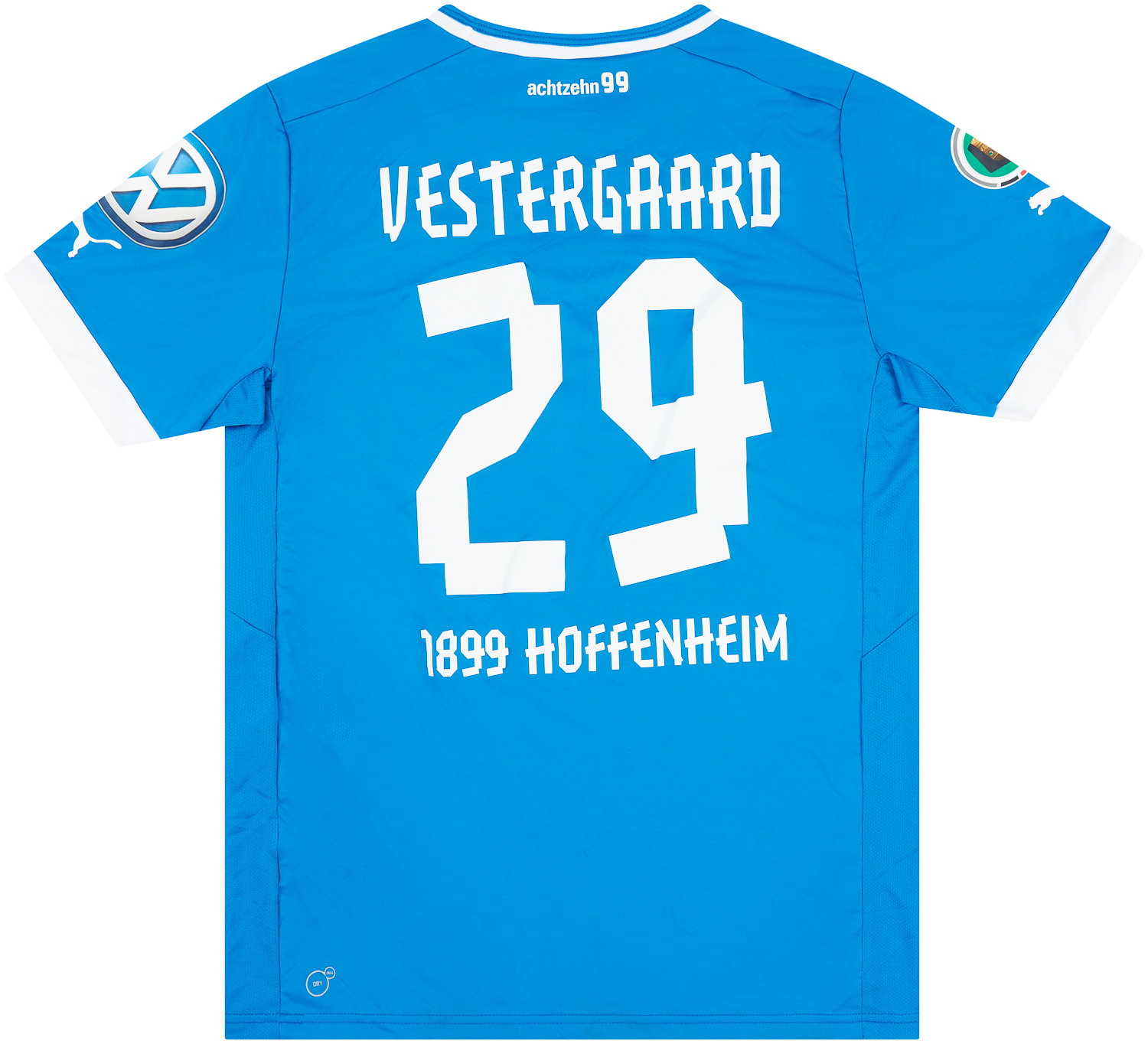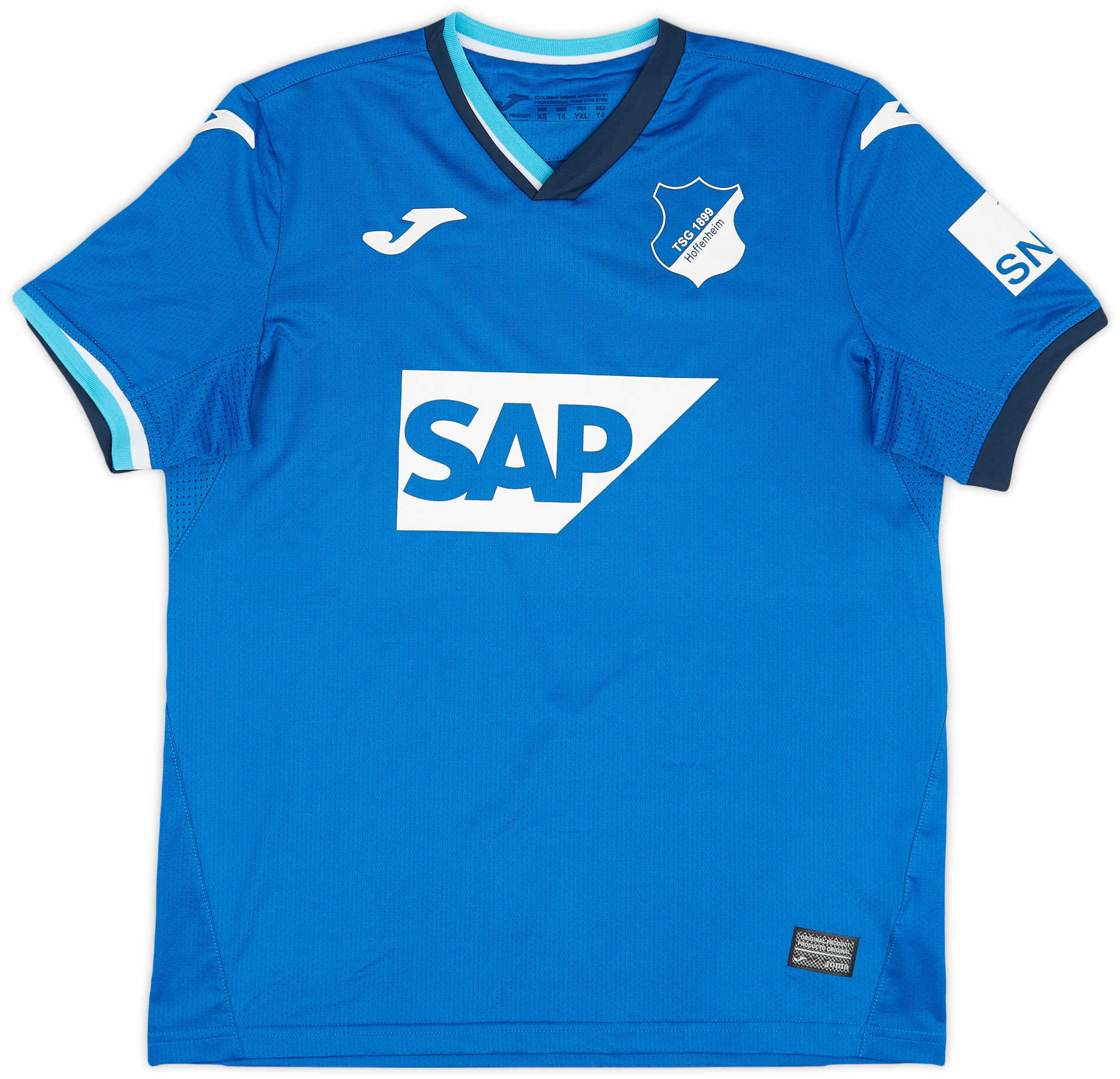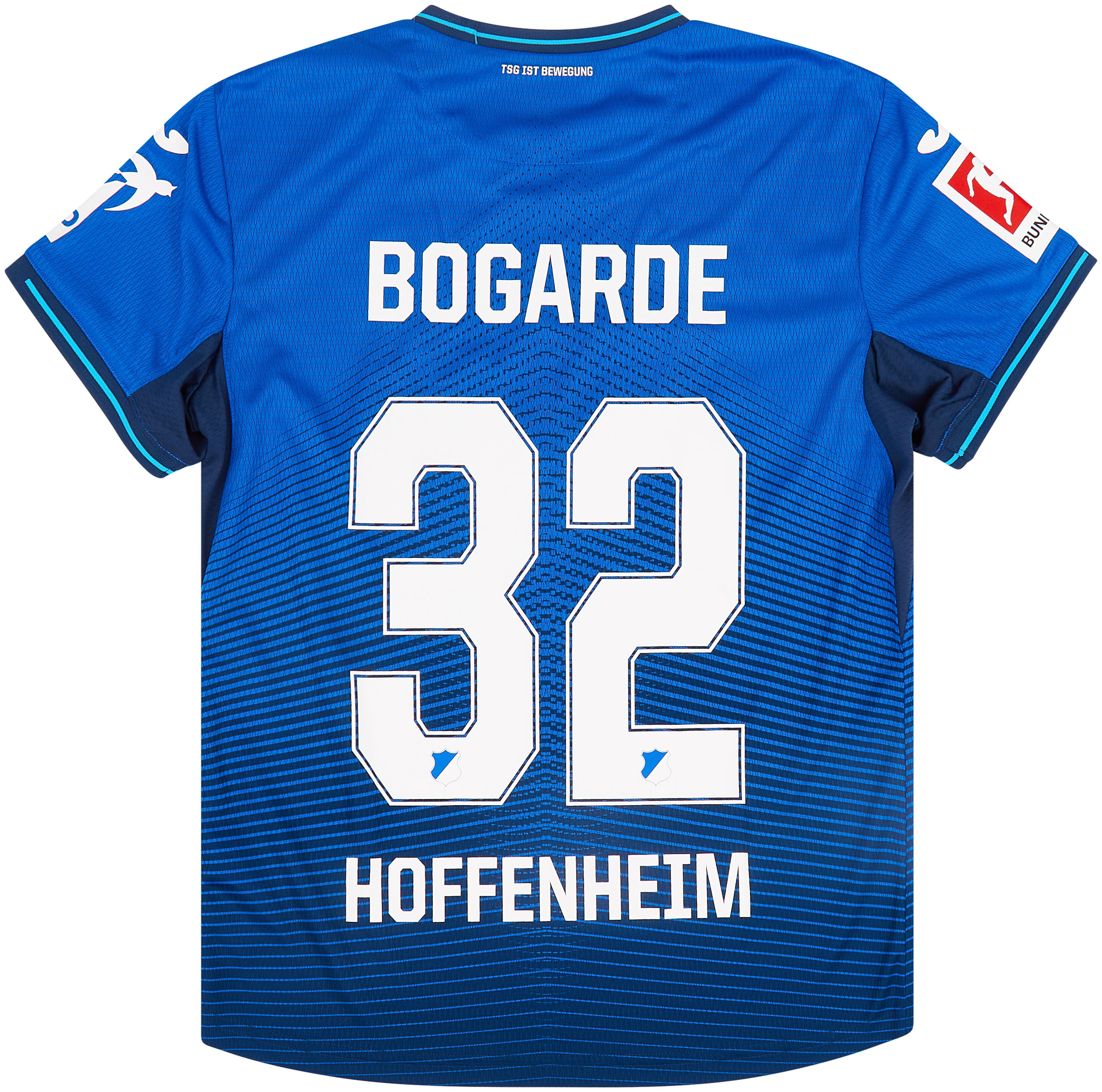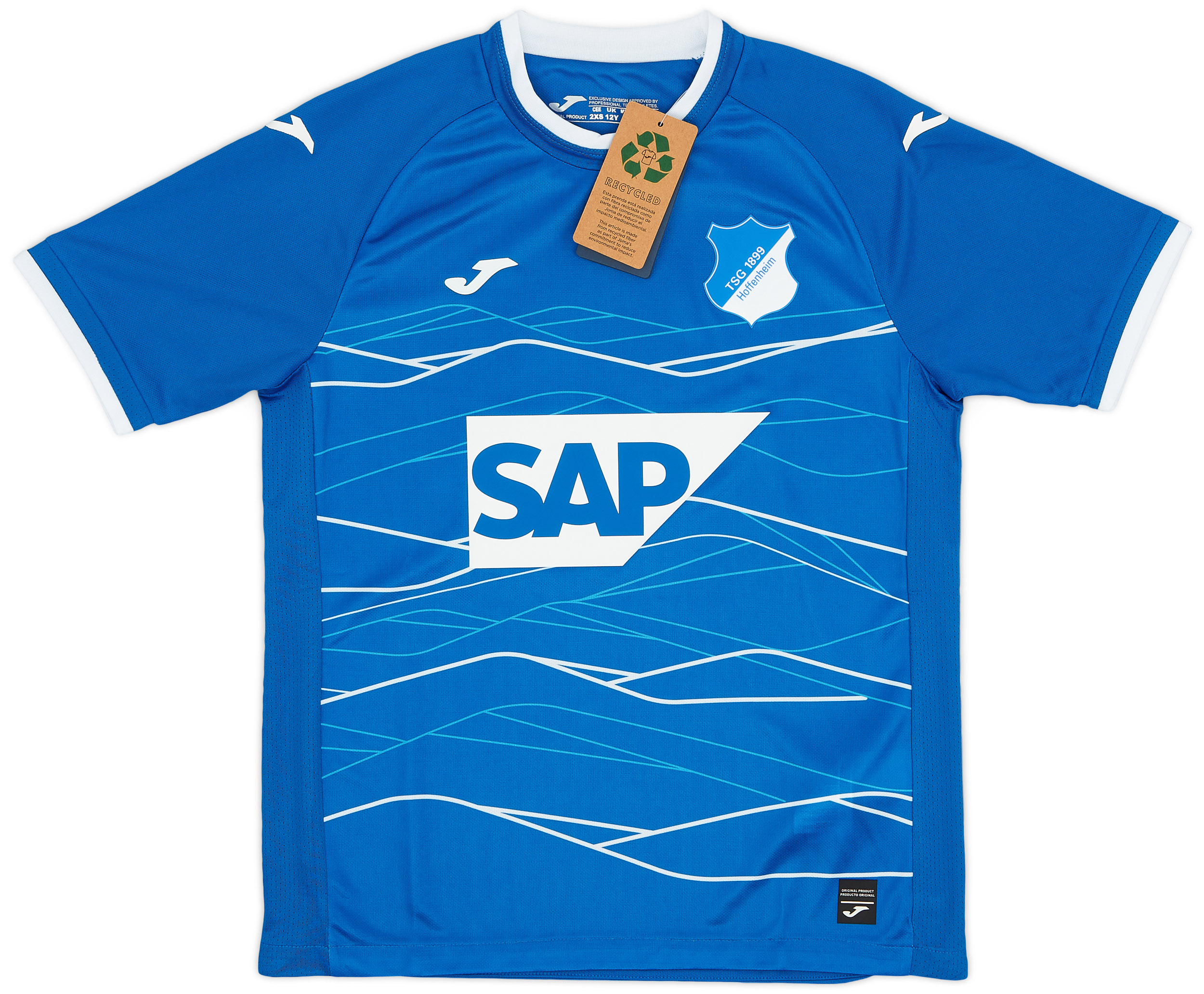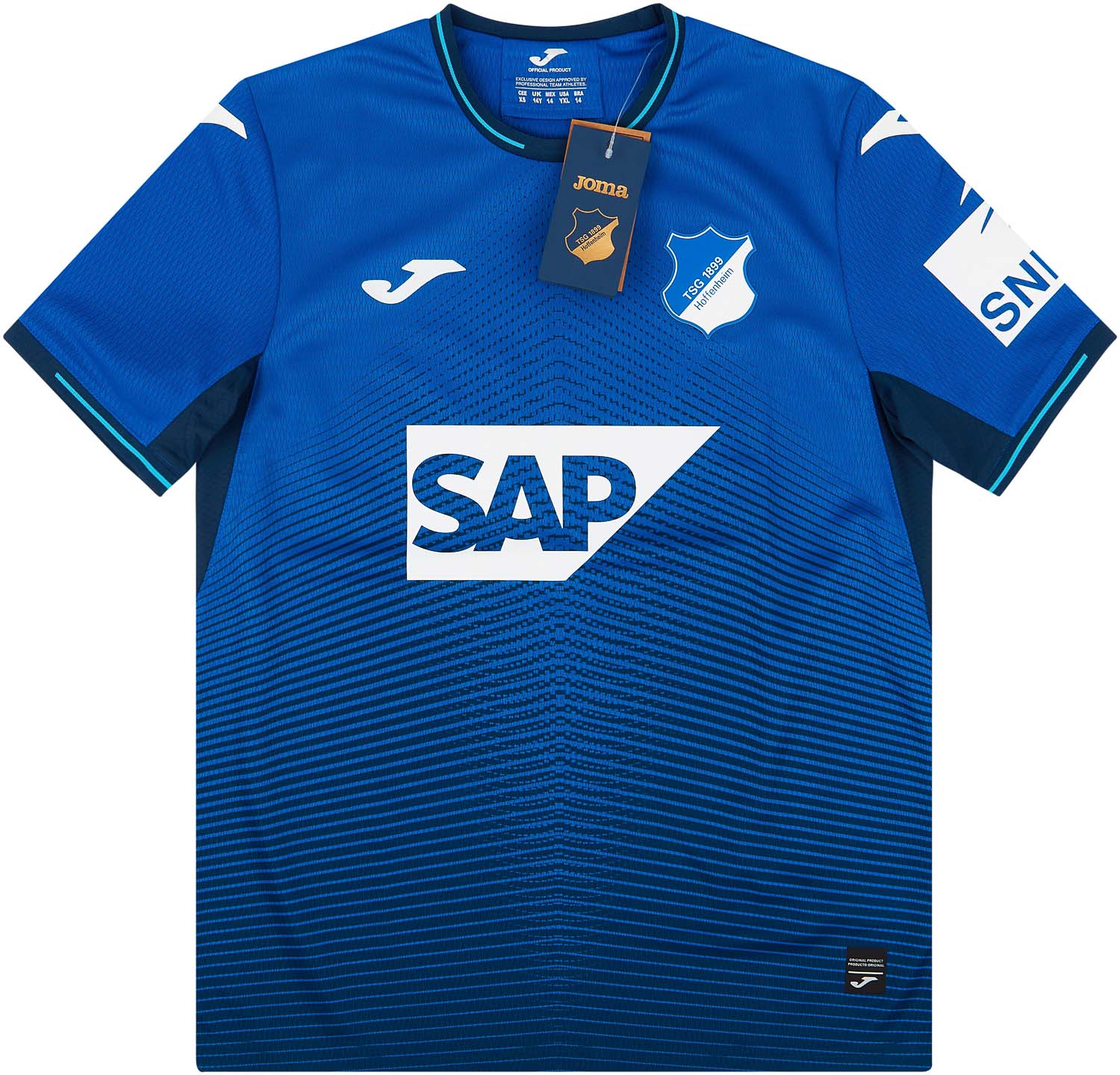TSG Hoffenheim
Introduction TSG Hoffenheim, also known as the “Die Kraichgauer,” is a German football club that has garnered attention for its remarkable journey from humble beginnings to establishing itself in the Bundesliga, Germany’s top-flight football league. Founded in 1899, the club has become synonymous with success and innovation in modern football. Hoffenheim’s unique story is defined […]
2012-13 TSG Hoffenheim Match Issue DFB Pokal Home Shirt Vestergaard #29
94.99£ - ca: €112
2008-09 TSG Hoffenheim Player Issue Home Shirt - 8/10 - (XL)
82.99£ - ca: €98
2010-12 TSG Hoffenheim Player Issue Away L/S Shirt - 9/10 - (L)
70.99£ - ca: €84
2020-21 TSG Hoffenheim GK Shirt Baumann #1 - 9/10 - (L)
70.99£ - ca: €84
2012-13 TSG Hoffenheim Third Shirt XL
70.99£ - ca: €84
2011-12 TSG Hoffenheim Away L/S Shirt - 9/10 - (L)
70.99£ - ca: €84
2017-18 TSG Hoffenheim Home Shirt Vogt #22 - 8/10 - (XXL)
58.99£ - ca: €70
2018-19 TSG Hoffenheim Home Shirt - 10/10 - (S)
58.99£ - ca: €70
2008-09 TSG Hoffenheim Player Issue Home Shirt - 6/10 - (XL)
58.99£ - ca: €70
2009-11 TSG Hoffenheim Away Shirt - 9/10 - (L)
58.99£ - ca: €70
2008-09 TSG Hoffenheim Player Issue Home Shirt - 7/10 - (XXL)
58.99£ - ca: €70
2009-11 TSG Hoffenheim Away Shirt - 6/10 - (XXL)
53.99£ - ca: €64
2017-18 TSG Hoffenheim Home Shirt - 9/10 - (XL)
53.99£ - ca: €64
2013-14 TSG Hoffenheim Home Shirt Hamad #11 - 8/10 - (M)
53.99£ - ca: €64
2016-17 TSG Hoffenheim Home Shirt Kramaric #27 - 6/10 - (S)
53.99£ - ca: €64
2009-11 TSG Hoffenheim Away Shirt - 7/10 - (XXL)
53.99£ - ca: €64
2019-20 TSG Hoffenheim Away Shirt (XL)
51.99£ - ca: €61
2008-09 TSG Hoffenheim Player Issue Away Shirt - 5/10 - (XXL)
47.99£ - ca: €57
2013-14 TSG Hoffenheim Home Shirt Klaus #10 - 9/10 - (XXL)
47.99£ - ca: €57
2017-18 TSG Hoffenheim Third Shirt - 8/10 - (3XL)
47.99£ - ca: €57
2017-18 TSG Hoffenheim Home Shirt - 7/10 - (S)
47.99£ - ca: €57
2012-13 TSG Hoffenheim Home Shirt - 9/10 - (M)
47.99£ - ca: €57
2014-15 TSG Hoffenheim Lotto 1/4 Zip Drill Top - 8/10 - (S)
47.99£ - ca: €57
2009-11 TSG Hoffenheim Home Shirt - 9/10 - (XL)
41.99£ - ca: €50
2009-11 TSG Hoffenheim Away Shirt - 8/10 - (L)
41.99£ - ca: €50
2009-10 TSG Hoffenheim Third Shirt - 6/10 - (L)
41.99£ - ca: €50
2009-11 TSG Hoffenheim Home Shirt - 8/10 - (M)
41.99£ - ca: €50
2009-11 TSG Hoffenheim Home Shirt - 9/10 - (XL)
41.99£ - ca: €50
2009-11 TSG Hoffenheim Home Shirt - 8/10 - (M)
41.99£ - ca: €50
2009-11 TSG Hoffenheim Home Shirt - 9/10 - (M)
41.99£ - ca: €50
2009-11 TSG Hoffenheim Home Shirt - 8/10 - (S)
41.99£ - ca: €50
2022-23 TSG Hoffenheim Joma Padded Jacket - (S)
41.99£ - ca: €50
2009-11 TSG Hoffenheim Home Shirt - 9/10 - (XL)
41.99£ - ca: €50
2009-10 TSG Hoffenheim Third Shirt - 7/10 - (XL)
41.99£ - ca: €50
2009-11 TSG Hoffenheim Home Shirt - 9/10 - (M)
41.99£ - ca: €50
2009-11 TSG Hoffenheim Home Shirt - 8/10 - (XL)
41.99£ - ca: €50
2009-11 TSG Hoffenheim Home Shirt - 8/10 - (S)
41.99£ - ca: €50
2015-16 TSG Hoffenheim Away Shirt - 9/10 - (M)
41.99£ - ca: €50
2009-10 TSG Hoffenheim Third Shirt Mlapa #15 - 6/10 - (M)
41.99£ - ca: €50
2009-11 TSG Hoffenheim Home Shirt - 9/10 - (XL)
41.99£ - ca: €50
2015-16 TSG Hoffenheim Away Shirt - 9/10 - (XXL)
41.99£ - ca: €50
2009-11 TSG Hoffenheim Home Shirt - 8/10 - (S)
41.99£ - ca: €50
2012-13 TSG Hoffenheim Home Shirt - 6/10 - (XL)
41.99£ - ca: €50
2012-13 TSG Hoffenheim Home Shirt - 8/10 - (XXL)
39.99£ - ca: €47
2009-11 TSG Hoffenheim Home Shirt - 7/10 - (L)
35.99£ - ca: €42
2016-17 TSG Hoffenheim Lotto Training Shirt - 8/10 - (XL)
35.99£ - ca: €42
2013-14 TSG Hoffenheim Home Shirt - 7/10 - (XXL)
35.99£ - ca: €42
2019-20 TSG Hoffenheim Home Shirt - 9/10 - (XL)
35.99£ - ca: €42
2011-12 TSG Hoffenheim Third Shirt - 9/10 - (XL.Boys)
35.99£ - ca: €42
2011-12 TSG Hoffenheim Home Shirt Williams #13 - 5/10 - (L)
31.99£ - ca: €38
2009-11 TSG Hoffenheim GK Shirt - 6/10 - (M)
29.99£ - ca: €35
2010-12 TSG Hoffenheim Away Shirt - 9/10 - (XL.Boys)
23.99£ - ca: €28
2020-21 TSG Hoffenheim Home Shirt - 9/10 - (XL.Boys)
23.99£ - ca: €28
2009-11 TSG Hoffenheim Home Shirt - 9/10 - (XL.Boys)
23.99£ - ca: €28
2010-12 TSG Hoffenheim Away Shirt - 5/10 - (S)
23.99£ - ca: €28
2021-22 TSG Hoffenheim Home Shirt Stiller #13 (Women's S)
23.99£ - ca: €28
2011-12 TSG Hoffenheim Away Shirt - 8/10 - (XXL.Boys)
23.99£ - ca: €28
2021-22 TSG Hoffenheim Home Shirt Bogarde #32 (Women's XL)
23.99£ - ca: €28
2020-21 TSG Hoffenheim Home Shirt - 4/10 - (L)
17.99£ - ca: €21
2022-23 TSG Hoffenheim Joma Training Top
17.99£ - ca: €21
2022-23 TSG Hoffenheim Joma Training Shirt
14.99£ - ca: €18
2019-20 TSG Hoffenheim GK Shirt - NEW
14.99£ - ca: €18
2022-23 TSG Hoffenheim Joma Training Vest
14.99£ - ca: €18
2022-23 TSG Hoffenheim Home Shirt - (KIDS)
11.99£ - ca: €14
2022-23 TSG Hoffenheim Joma Polo T-Shirt (S)
11.99£ - ca: €14
2019-20 TSG Hoffenheim GK Shorts (3XL)
10.99£ - ca: €13
2019-20 TSG Hoffenheim Joma Training Shorts (XS)
9.99£ - ca: €12
2022-23 TSG Hoffenheim Joma Training Shorts - (S)
7.99£ - ca: €9
2022-23 TSG Hoffenheim Home Shorts
7.99£ - ca: €9
2021-22 TSG Hoffenheim Home Shirt (KIDS)
6.99£ - ca: €8
2022-23 TSG Hoffenheim GK Socks (L)
1.99£ - ca: €2
2022-23 TSG Hoffenheim Third Socks
1.49£ - ca: €2
Warning: A non-numeric value encountered in /var/www/netskribent.dk/retro-football-shirt.com/wp-content/themes/boot5/single-clubs.php on line 148
Introduction
TSG Hoffenheim, also known as the “Die Kraichgauer,” is a German football club that has garnered attention for its remarkable journey from humble beginnings to establishing itself in the Bundesliga, Germany’s top-flight football league. Founded in 1899, the club has become synonymous with success and innovation in modern football. Hoffenheim’s unique story is defined by its commitment to youth development, strategic investments, and a strong community ethos, making the club a significant player in the world of football.
Club History
The origins of TSG Hoffenheim can be traced back to 1899 when it was established as a gymnastics club. Over the years, the football section grew, and by 1921, the club began competing in various local leagues. However, it wasn’t until the early 2000s that Hoffenheim experienced a transformative phase. In 2000, under the leadership of entrepreneur Dietmar Hopp, a co-founder of software giant SAP, the club underwent substantial restructuring. Hopp’s vision was to develop a top-quality training and youth academy that would nurture local talents, and he invested heavily into the club’s infrastructure and facilities. This investment put Hoffenheim on the path to professional football.
By 2007, Hoffenheim achieved a historic milestone by earning promotion to the Bundesliga, marking its first foray into Germany’s highest league. The club’s rise was meteoric, as they finished 11th in their debut season and qualified for the UEFA Europa League in the 2017-2018 season. Hoffenheim’s journey from the lower leagues to the Bundesliga showcases the importance of strategic planning and commitment to growth.
Achievements
TSG Hoffenheim’s achievements in German football are notable, particularly considering the club’s short history in the top tier. The pinnacle of their achievements came in the 2016-2017 season when they finished fourth in the Bundesliga. This performance secured them a place in the UEFA Champions League qualifying rounds, marking their debut in Europe’s premier club competition. They went on to finish third in the 2017-2018 Bundesliga season, ensuring their continued presence in European football.
In addition to league performances, Hoffenheim has made strides in national cup competitions. The club reached the quarter-finals of the DFB-Pokal several times, with their best showing coming in the 2017-2018 season. Their ability to compete at high levels consistently highlights the club’s strategic growth and ambition.
Significant Players and Matches
Over the years, TSG Hoffenheim has seen a number of players make significant impacts on the pitch. One of the most notable players is Sebastian Rudy, who came through the youth ranks and played a significant role in the club’s rise to fame before moving to larger clubs like Bayern Munich. Another standout player is Andrej Kramarić, who joined the club in 2015 and quickly became a fan favorite, known for his goal-scoring ability and creativity on the field. Kramarić’s contributions have been crucial in many matches, particularly during their European campaigns.
Regarding landmark matches, the 4-0 away win against Olympique Marseille in the UEFA Europa League in 2017 was historic, as it showcased Hoffenheim’s capability to compete on an international level. Additionally, their thrilling 6-0 victory over Borussia Dortmund in January 2019 was a highlight, displaying their attacking prowess and ability to challenge even the most established Bundesliga teams.
Cultural Impact
Beyond its footballing accomplishments, TSG Hoffenheim has had a considerable impact on local culture and its fanbase. The club embraces a community-oriented approach, engaging with fans and promoting local talent through its youth academy. The Sinsheim stadium, now known as the Rhein-Neckar-Arena, represents a hub for local supporters, fostering a vibrant match day atmosphere.
Hoffenheim’s identity as a small but ambitious club resonates with its supporters, who take pride in the team’s achievements and its commitment to the community. The club’s facilities have also contributed to local youth development, providing aspiring young footballers with the tools and environment needed to excel. This integration with local culture solidifies Hoffenheim’s role not only as a football club but as a community institution.
Conclusion
In conclusion, TSG Hoffenheim’s journey from a small gymnastics club to a significant player in German football is a testament to the transformative power of vision and investment in youth development. With impressive achievements in domestic and international competitions, the club has carved a niche for itself in the football world. As it continues to build on its success and foster local talent, Hoffenheim’s story is a reminder of the potential that lies within football to unite communities and inspire future generations. The identity of TSG Hoffenheim embodies ambition, community, and excellence, ensuring its place in football history will endure.
